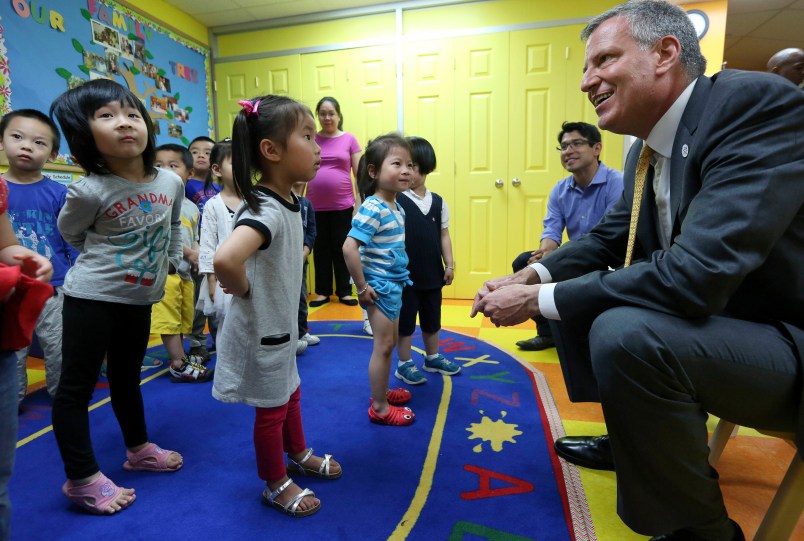It may be a new year full of new hopes, but oof, you wouldn’t know it from talking to American progressives. Recent polls show that Democrats’ Obama-era optimism is waning big-time, and my conversations with the Beltway’s progressives are grumpy verging on gloomy.
Sure, the 2014 midterms were dismaying. And yes, despite important progress on health care, the environment, public education, foreign policy, and much more, the Obama administration has been surprisingly stymied by nihilistic conservative aversion to governing. Our elections are increasingly dominated by slushy, shady money. Our legislative process is plagued by the radicalizing effects of gerrymandering and primary challenges in pursuit of radical purity. On almost every issue, partisan differences seem more like deep ideological trenches.
The dysfunction of our public institutions is particularly staggering in light of the size and gravity of our problems. For instance, while Congress struggles to decide over how much austerity to impose on our discretionary spending, the United States’ child poverty rate ranks among the highest of all developed nations. One in five American children is growing up in poverty today. And that number probably misrepresents the degree to which American children are struggling: nearly half of American students qualified for free or reduced lunch in 2011. Yet our tax revenues (as a share of GDP, in these data) remain amongst the developed world’s lowest.
High child poverty and little willingness to raise public revenue to address it? That would be reason enough to get cynical.
But I think pessimist progressives are wrong. For what is a progressive without her belief that the world can be made better?
There are pitfalls on the road to restoring progressive optimism. Above all, beware false equivalence types who earnestly hope that this will be the year that conservatives and progressives alike retreat from their ideological trenches to do what’s right for working American families. It would be nice if there were a reason to place faith in the good intentions and civic mindedness of legislators like Mitch McConnell. But given that they have very real incentives to maintain gridlock, to whip up their base, and to avoid political risk-taking, Green Lantern bromides about healing the nation’s ideological wounds are largely the product of wishful, magical thinking. Folks who peg their hopes to a new era of good feelings in DC are going to be disappointed daily—nay, hourly.
Instead, focus on political and demographic currents. Take the child poverty example, for instance. It’s increasingly clear that universal pre-K is coming. It probably won’t arrive in 2015. It might not be for a few more years. But this longtime progressive dream is going to happen—you can take that to the bank.
Why? Because pre-K is great for kids, but it’s also good for working families. It saves them money on childcare and makes it easier for parents and other family members to work. It prepares young children to be better workers someday while also supporting working parents right now. In other words, while making high-quality public pre-K available to all families who want it won’t solve child poverty, it will help. Heck, the U.S. Chamber of Commerce even joins forces with the Center for American Progress when it comes to supporting investments in early education. This is a political and economic no-brainer with huge upside for underserved children and families. It’s happening.
It gets better, by the way. Universal pre-K illustrates a critical progressive value: programs that support underserved, low-income children and parents make it easier for them to live dignified lives. Whenever you hear about pre-K’s promise—stuff like “every $1 we invest in quality pre-K returns $7 in benefits and savings”—that usually includes the savings to society that come from children who grow up less likely to drop out of school, go to prison, have children out of wedlock, or go on public assistance. That is, those savings come from pre-K’s support for a more traditional life path. As high-quality pre-K expands (and quality matters), progressives can—and should—point this out. Are there other ways that the government can act to reduce the economic strains on low-income families? Or, in more conservative verbiage, are there other ways to support families so that they are more likely to work, stay together, and raise healthy kids? Absolutely. And those policies will benefit from their semblance to pre-K investments.
Of course, there’s plenty other good news for progressives in 2015 and beyond. Congressional gridlock (read also: conservative ineptitude) on immigration has Republicans in an even more terrible spot with Hispanic voters than before. National demographic trends still suggest that the electorate will be less white and less conservative every year for the foreseeable future. No amount of yelling whilst standing athwart history is going to stop those trends.
So: Pshaw to the pessimists! Down with the disillusioned! Damn the doomsayers! Full speed ahead!
Conor P. Williams, PhD is a Senior Researcher in New America’s Early Education Initiative. Follow him on Twitter @conorpwilliams. Follow him on Facebook.






